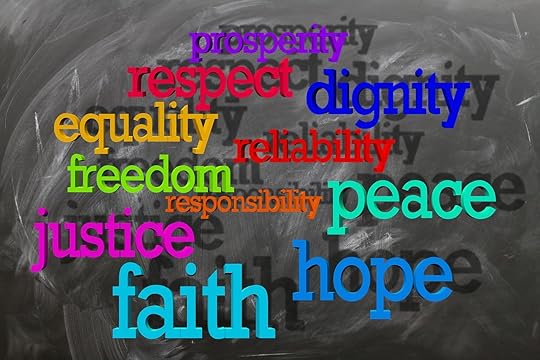Rick Mattson's Blog, page 17
August 29, 2017
Bible Interpretation Part 5: The Justice Objection 2

Artwork courtesy of Steve Blake
So far in this set of posts regarding Bible interpretation, I’ve replied to four different objections to a traditional reading: the naturalistic, the literalistic, the pluralistic and the “justice” objection.
This is part two of the justice objection, and can be summarized as follows:
Whenever a traditional interpretation of the Bible doesn’t account for racial, sexual and gender justice, it must be opposed — adamantly so.
Examples are:
Patriarchy: The injustice of social structures that elevate men over other genders.
Homophobia: The injustice of forbidding LGBTQ relationships, intimacy and marriage.
Racism: The injustice of racial discrimination.
(Okay, a refresher on what we’re talking about here:
I stand in the tradition of Bible reading and interpretation that goes back through the centuries to the early church. It’s based on what’s called “apostolic authority” — that is, rooted in the teaching of the twelve apostles.
Thus I claim a heritage that goes back through Carl Henry and C.S. Lewis, Martin Luther and John Calvin, Thomas Aquinas and Augustine of Hippo, and eventually to the NT writers. It’s summarized in the early creeds such as the Apostles‘ and Nicene creeds.
Modern readers of the Bible object to this traditional reading in various ways, one of which is the “justice” objection. My response to this objection follows.)
My reply: There is much to affirm in this list of justice issues. But instead of responding to each item, I’d like to suggest a way forward, an overall strategy for moving toward true justice.
But first . . . you may be wondering if I’m shooting from the hip on this topic.
Not at all. I’ve been enmeshed in these issues for many years on college campuses, not only in theory, but in real relationships with people I care about deeply . . . people quite different than myself.
To respond, then: It seems to me the main conflict between justice-critics and traditional Bible readers can be distilled down to this: starting points. That is — the first premises and assumptions of the parties involved.
Thus the crucial question is whether the critic’s starting point is either Scripture or Western/progressive/secular culture.
If Cultural starting point. Reiterating from my prior post: Why think contemporary culture an authoritative source of truth and wisdom? After all, that same culture is also brimming with violence, oppression, racism — in short, injustice.
Relativism* lurks here, reducing justice merely to the preferences of certain interest groups.
If Scriptural starting point: I say to the critic: Go ahead and make your case, biblically. I’m listening. That’s what this is about — sincere readers of the Bible respectfully discussing and debating with each other what the Bible actually teaches.
Unfortunately, on justice issues such as those listed above, respectful dialogue is rare. Sometimes even forbidden.
* * *
Note that if a critic’s source of wisdom is progressive culture and the traditional Christian’s is Scripture, the two persons will simply talk past each other. . . UNLESS . . . unless by God’s grace there is overlap, which there sometimes is.
This overlap, even if modest, can serve as a platform of common ground for an expanded discussion about justice.
Then again, the parties involved have to want it.
I know they want justice. But do they want a conversation?
* * *
In my next post: a biblical vision of justice.
*Relativism is when truth is dependent solely on context or perspective rather than being “absolute” or objective.
July 17, 2017
Bible Interpretation Part 4: The Justice Objection 1
In my prior three posts I responded to 1) the naturalistic objection to Bible interpretation, 2) the literalistic objection and 3) the pluralistic objection.
This post is about the “justice” objection, which has various forms but perhaps can be summarized as follows:
It would be unjust of God to reveal himself primarily in only one religious tradition such as Christianity and the Bible, and exclude other traditions such as Islam and Hinduism.
By “unjust” we mean unfair, unequal, showing partiality, biased. Any interpretation of the Bible that leads to these injustices cannot be accepted.
Two replies:
Human justice: The notions of justice just mentioned are grounded in human wisdom. But why should God be held to ideas of human justice?
If God wishes to reveal himself in certain ways and not others, that’s his business, his prerogative, his justice.
Source of justice: Where do we get our ideas of justice that we bring to God? If the answer here in America is “cultural preferences for fairness and equality,” we rightly ask, What makes American cultural preferences a reliable source of wisdom?
It wasn’t that long ago that “American cultural preferences” took for granted the inferiority of women and minorities.
* * *
I don’t wish to be a curmudgeon who dismisses the good intent of justice advocates in interpreting the Bible. In fact, I am a justice advocate myself in other ways.
But as a traditional Christian I think it’s important to ground our ideas of justice in the character of God rather than the character and ideas of flawed human beings and their ever-changing culture(s).
image courtesy of Pixabay
June 20, 2017
Bible Interpretation Part 3: The Pluralist Objection
In the prior two posts, I responded to the naturalistic and literalistic objections to Bible interpretation.
The “pluralist” objection is third, and goes something like this:
The Bible is just one revelation among many of the Divine. Any interpretation of the Bible that excludes other religious traditions or somehow invalidates them cannot be accepted.
Two Replies:
1. Excluding exclusivism: the pluralist is actually claiming that the traditional interpretation of the Bible — that, for example, Jesus Christ is the only true pathway to God — going back 2,000 years to the early church, is false.
Think about that. Billions of Christians throughout history have held to the traditional view, and the pluralist is “excluding” them by saying their view is wrong.
2. How do you know? I like to ask the pluralist how she knows the divine has been revealed in a plurality of traditions — such as Islam, Buddhism, Hinduism, etc.
The pluralist might respond, “It only makes sense that God wouldn’t reveal himself in just one tradition” — to which I say, Why not? How do you know God so well?
I also might ask how all these religious views can be valid if they contradict each other (which they do).
* * * * *
I find it useful to press the pluralist for a basis of his accusations against traditional Christianity. Often, the pluralist responds with something about “justice.” It’s only just, so says the pluralist, that God would not “exclude” any religions, but would include everyone.
I’ll respond to this notion of justice in my next post.
June 5, 2017
Bible Interpretation Part 2: The Literalistic Objection
In my prior post I replied to the naturalistic objection to Bible interpretation.
In this post I’d like to respond to the literalistic objection, which goes something like this:
The Bible is the inerrant Word of God and must be read literally, “as is.” You don’t “interpret” Scripture, you just read it and apply it to your life.
I agree with the good intent of reading the Bible plainly, but not its conclusion — that somehow we can avoid the process of interpretation.
Three replies, then:
1. Translations: We’ve already accepted a measure of “interpretation” of the Bible when we read modern translations given us by scholars, such as the KJV, NIV, ESV, NLT, etc. There’s really no such thing as not interpreting the Bible.
2. Community: The “no interpretation” view tends to go solo. It says the Bible is so plain to understand that other readers and interpreters (even commentaries) are not needed.
But it seems to me approaching the Bible without the guardrails of community is a form of individualism, perhaps arrogance.
3. Literalism a true oddity: Pure literalism is never something the Bible itself calls for. In fact, the Bible uses many forms of non-literal communication to get its message across:
It refers to God as a “rock,” who has “eyes” and “ears” and “hands.” Isaiah 11 refers to the “rod of his mouth,” Psalm 91 to God’s “feathers.”
Jesus taught in fictional parables, and is referred to as a “shepherd” and a “gate.” And the Bible is loaded with various genres of literature that speak to the broad spectrum of its readers.
* * * * *
I think the thing to avoid is not interpretation per se, but bad interpretation. Thus we need to submit our own readings of Scripture to the wisdom of the body of Christ, which is rightly called the interpretive community.*
Next time, I’ll respond to the “pluralistic objection.”
* See Gordon Fee and Douglas Stuart, How to Read the Bible for All Its Worth, Introduction.
Bible Interpretation Part 1: The Naturalistic Objection

Bernini’s David, Borghese Gallery, Rome, Italy
College students of varying backgrounds often raise objections to traditional interpretations of the Bible. Here are three types of objections I hear regularly:
Naturalistic
Literalistic
Pluralistic
Naturalistic objections are critical of anything that is miraculous or otherwise “fanciful” in the Bible.
Thus the supernatural elements found in the Gospels, Exodus and numerous other places in Scripture are automatically rejected.
“Fanciful” would include unusual events that perhaps border on the miraculous but definitely sound mythical to the modern ear: the fall of Jericho (Joshua 6) or the slaying of Goliath (1 Samuel 17).
Sometimes the naturalistic attitude is, “C’mon, you can’t seriously believe in such legends. These accounts are no different than the mythological stories of Zeus or Apollo or Hercules.”
Replies
1. Science: What sounds strange to the modern ear didn’t sound strange to the ancient ear. Modern sensibilities are attuned to science, but in fact science can make no claims about Jericho* or Goliath. Those are not scientific issues.
2. Zeus: It’s an odd argument you’re making: Zeus doesn’t exist; therefore the God of the Bible doesn’t exist. How does that follow?
3. Resurrection: Let’s talk about the resurrection of Jesus Christ, for which there is plenty of evidence. Believing in the exploits of Joshua or King David are easy by comparison.
In my next post I’ll talk about the literalistic objection.
*Archeology can examine the ruins of ancient cities but probably cannot tell us whether God intervened in them directly.
April 9, 2017
Religious Reciprocity: Part 3
Is it fair for me to expect a “satisfied” adherent of another religion to investigate Christianity, while I am not necessarily motivated to pursue their religion?
The short answer is this: only if Christianity is true.
This answer, however, begs the question of whether Christianity is actually true, and how a person could possibly know this if they’ve never thoroughly investigated all the alternatives.
For example, if I never seriously pursued Islam or Hinduism in a thorough manner — including the doctrines, claims, histories and practices of these religions — can I claim to be a “well-informed” person before embracing Christianity?
Probably not.
However, am I obligated to understand all the alternatives out there before deciding on a belief system?
Also, probably not.
Most of us have jobs and busy lives and we simply can’t know everything about every possible worldview before choosing a worldview of our own.
So let me suggest a charitable solution for thoughtful Christians, that comes in two stages:
1. Case-making: I must know the main arguments for my worldview, in this case, Christianity. Lee Strobel has aptly entitled this endeavor The Case for Christ.
2. Dabbling along the way: By dabbling, I mean taking an interest in other religions even if you’re committed to your own (which I am). That is, one need not withhold belief in a worldview such as Christianity until all alternatives are exhausted.
I think it’s OK to stand within a tradition (Christianity, for me) while examining other traditions. I believe it’s wise — and intellectually honest — to know something of neighboring faiths, whether it’s the two religions mentioned above or others such as Mormonism, Judaism or Buddhism.
To the original question then: Is it fair to expect others to investigate Christianity if I don’t investigate their religions?
Well, I think it’s fair to expect them to investigate Christianity if I think a good case can be made for its truthfulness.
But I also shouldn’t let myself off the hook. I shouldn’t just dwell comfortably in my own worldview if I’m trying to be a thoughtful and charitable Christian.
Minimally, I should dabble in what the others are saying so that I am at least conversant in the faiths of my neighbors.
Resources:
Neighboring Faiths: A Christian Introduction to World Religions by Winfred Corduan
The Compact Guide To World Religions ed. Dean Halverson
March 1, 2017
Religious Reciprocity: Part 1
What happens to persons who’ve never taken the time and trouble to pursue Christianity as a possible “true religion”?
Perhaps they feel satisfied with their own views, whether religious or not. Is that wrong? Will God punish them?
One person put it this way in an email:
What if sincere Jews, Muslims, Hindus, Buddhists and other non-Christians did not here a clear, detailed or complete presentation of the gospel at any point in their life but only heard a bit about Jesus, the Bible and Christianity but did not make any extra effort to look into this because they were satisfied or convinced in their own religion or did not feel the need to do this etc. and, hence, only rejected this inaccurate or incomplete presentation of the gospel but not a clear, detailed or complete presentation of the gospel?
This is an astute question because it reminds me that if Christianity is not true but, rather, Islam (for example) is true, I’d have never made the conscious effort to rigorously pursue Islam, being satisfied, as I am, with Jesus.
Sure, I might have investigated Islam in a passing way, probably so that I am informed about it professionally. But actively pursuing it? For my own heart devotion? Probably not.
Yet, I think nothing of the risk others take in actively seeking Jesus.
Two questions emerge from this discussion:
What happens to those who’ve never heard a detailed, quality presentation of the gospel message, and feel satisfied with their own religion or worldview?
Am I as a Christian justified in expecting others to pursue my religion while I do not pursue theirs?
I’ll start working on these questions in my next post.
Religious Reciprocity: Part 2
A question from my prior post is this:
What happens to those who’ve never heard a detailed, quality presentation of the gospel message, and feel satisfied with their own religion or worldview?
The implied question is whether God will accept this person on the day of judgment, given that the person had no compelling reason to investigate Christianity.
My response is that I believe God factors in all the circumstances of our lives in administering his justice.
That is, he holds human beings responsible for the amount of light they’ve been given, whether much or little:
“From everyone who has been given much, much will be demanded” (Luke 12:48).
However, I also believe that God’s presence is more universally recognizable than is often thought:
“What may be known about God is plain to them, because God has made it plain to them. 20 For since the creation of the world God’s invisible qualities—his eternal power and divine nature—have been clearly seen, being understood from what has been made, so that people are without excuse” (Romans 1:19-20).
To get back to the question, then: What of the fate of those who’ve never heard about Jesus?
Or never heard a “quality presentation” about Jesus?
At the very least, they can recognize God in nature (see Romans 1, just mentioned) and in conscience (see Romans 2:14-16).
Beyond that, it’s hard to say. Theologian David Clark writes,
“Somehow— it’s speculation to say exactly how— God is at work to draw all people to himself. . . . The clear part is that God has instructed Christians to offer others the opportunity to receive the gift of salvation. The less clear part is what God is doing behind the scenes. If God’s character and intentions are as the Bible says [God’s justice is intensely opposed to evil; God’s grace is expressed in a passionate love for people], I surmise God is doing far more than we know.”
Clark concludes that God “draws all repentant people to himself. . . . I believe God will give the chance to all. We don’t know how this works.” *
* * *
In my next post I’ll tackle the question of whether it’s fair for me to expect a “satisfied” adherent of another religion to investigate Christianity. And would I reciprocate?
*David Clark, “Religious Pluralism and Christian Exclusivism,” in To Everyone an Answer: A Case for the Christian Worldview (Downers Grove, IL: InterVarsity Press, 2004), pp. 299-300.
Image courtesy of Tuomas_Lehtinen at FreeDigitalPhotos.net
December 17, 2016
Why isn’t God more Obvious? Part 3
Melanie asked if she could talk with me about faith in God. Or her lack of faith. More precisely, her former faith.
I agreed.
At dinner in a large cafeteria, we sat together. Six other college students gathered around to listen in.
Melanie recounted how she’d been raised in the church and had once been a strong believer, but had fallen away due to being unconvinced of God’s existence.
“And now?” I asked.
Agnostic. She just doesn’t know. She thinks there may be a God but she wishes for more tangible, convincing evidence.
And wouldn’t it make sense, she went on, for God to provide such evidence to everyone? After all, there’s a lot at stake here: eternity is in the balance.
I replied that there is, in fact, quite a bit of evidence for God’s existence and his self-disclosure in Christ.
Melanie objected that such evidence is still not enough for her.
“How much evidence is enough?” I asked.
“Enough to convince me,” she said firmly.
Then she went on to say that it’s not her fault that she doesn’t believe. She can’t make herself believe. God would need to make himself totally obvious. Irrefutably so.
I suggested that it may be presumptuous for the creature (her) to make such demands of the Creator, and that perhaps she should adjust her expectations of God.
She took this as an offense, a knock on her sincerity.
Note to self: Motive check. Don’t try to win an argument or fall in love with your own rhetoric. Need to listen to God’s Spirit. And think of what you’re modeling to other students listening in.
* * *
In my next post: Melanie and I get down to brass tacks.










